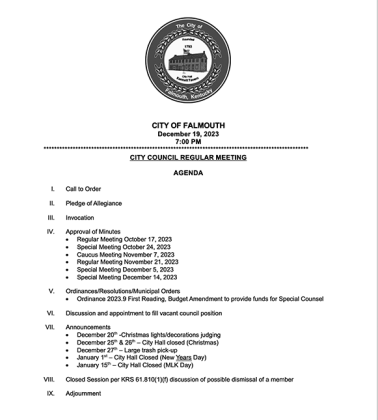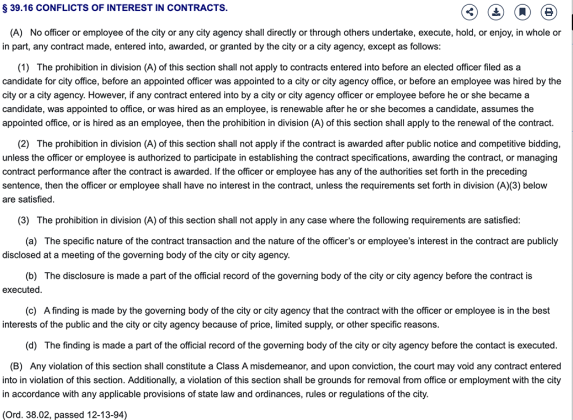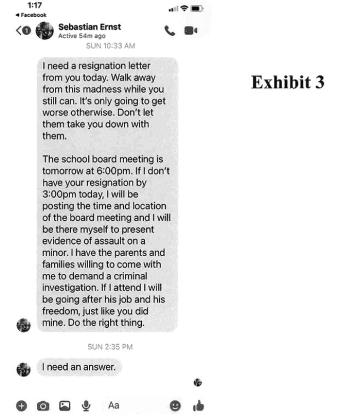Falmouth mayor removed from office after tumultuous year
By Carolyn Reid
For the second time since 2017, a Falmouth mayor has been impeached. The removal of Sebastian Ernst from the seat of mayor was based on charges of “misconduct and/or willful neglect in the performance of the duties of his office.”
Ernst, whose baby was born the day before, did not appear at the hearing and did not send an attorney to represent his case but did send a packet of information, approximately one-half inch or so in volume, in his defense. That packet was distributed to the council and to Falmouth City Council’s Attorney Luke Morgan by City Clerk Susan Bishop minutes before the hearing began.
Retired Circuit Judge Robert McGinnis presided over the meeting that took approximately one hour and 15 minutes, including the closed session. During that time, Morgan presented evidence to show the case against Ernst, and he and McGinnis both examined the information presented and confirmed that at no time had Ernst reached out for a continuation of the hearing based on his circumstances that day. (The agenda released in the previous meeting had mentioned moving the caucus to January 9 due to the new year, but no request to move the hearing was submitted.)
Morgan presented the charges to the council, explaining each to an extent the court would have record–a court reporter was on-site–and so that the council and those in attendance could hear the case against Ernst. He did advise the council to go into closed session in order to “talk freely” about the packet of information they had received. This advice is in accordance with KRS 61.810, which says, “All meetings of a quorum of the members of any public agency at which any public business is discussed or at which any action is taken by the agency, shall be public meetings, open to the public at all times, except for the following: (f) Discussions or hearings which might lead to the appointment, discipline, or dismissal of an individual employee, member, or student without restricting that employee’s, member’s, or student’s right to a public hearing if requested.
The decisions regarding the charges were voted in public, as was the impeachment vote.
To state the case, Morgan presented the evidence released during the meeting in December that led to the proceedings, adding explanations to each charge. Ernst’s remarks regarding each charge, based upon the information he submitted, is included.
Charge 1: Morgan cited the message sent by the mayor to Rick Brown, Chair of the PC Republican Party, stating city hall would no longer be available for the party to use to meet because “I don’t believe the current Pendleton County Republic Party aligns with my Conservative Christian values.” Morgan argued Ernst denied the organization’s First Amendment right to assemble on public grounds due to his beliefs. He argued the city could be found liable for the rights violation.
Ernst’s response to the charge: Ernst said he and his family are life-long Republicans, and the party has been able to use the Smoking Pig Tavern many times over the years for local Republican Party campaigns, rallies, and monthly meetings.”
He said this is an example of his support for the party. He went on to say the message he sent, listed as Exhibit 1, was a private message he sent to Rick Brown, and he was stating he had not attended lately because of beliefs he had expressed to Brown about the party. He stated this was not “an edict as the Mayor of Falmouth,” and the message was posted without “collaborating with [Ernst] or the rest of the party before doing so.” He said the reason was shared in a follow-up message that the “decision was to keep city hall non-partisan,” and he offered another city-owned property, the planned recreation center, “that was more fitting for the party mission and public perception,” even stating the hope Democrats and Republicans could rent rooms and foster friendships and debate.
Charge 2: Ernst used his personal page as his mayoral page in addition to his business and personal page. Morgan cited a conflict arising due to the combined use, and he read Ordinance 39.15: Conflicts of Interest in General, as the support for this charge.
Ernst’s response to the charge: Ernst answered that he has no knowledge of a Falmouth Mayor Facebook page, and he has never used the City of Falmouth Facebook page to promote his “own business ventures.” He submitted screenshots of posts where he used his own account to promote city events, “which [he] believes to be a noble goal as a citizen, not to unfairly enrich [himself] or [his] family." He stated he did the same as a city council member, and so do other members of the legislative body. He continued he had never received any written complaints from council or constituents about the use of his page before the impeachment charges December 19.
He acknowledged the city has a Facebook page he uses only to promote “Shop Local,” and he recalled former Mayor Max Goldberg owned several businesses in town, and several of the same buildings Ernst and his family own today, and was not “investigated or impeached for being a mayor as well as a businessman.” He referred to James Smith, Mayor of Cynthiana and co-owner of Rohs Opera House, as another mayor who promotes his business and his city on his personal page. He denied any benefits to himself or others in his role as mayor except for the salary set by council. He defended his use of his page as a way to promote and help one another because it “...is what small-town America is all about.”
Charge 3: Morgan shared the text Ernst sent to Councilperson Bobby Pettit, demanding his resignation or he would appear at the school board meeting with parents and families who would “demand a criminal investigation.”
“If I attend,” the text continues, “I will be going after his job and his freedom just like you did mine. Do the right thing.” Approximately four hours later, Ernst contacted Pettit again. “I need an answer.”
Ernst’s response to this charge: “I have been involved in City of Falmouth politics for eight years, and never has anyone attempted to harass and intimidate me in the way that Bob Pettit has over the last several months.” He goes on to say Pettit was not elected to council, but he was appointed upon the resignation of T. W. Morrison. He states that soon after Pettit’s appointment, he “took it upon himself to start investigating my personal life to look for evidence of illegal activity in order to impeach me. He says in the defense that Pettit and County Judge/Executive David Fields contacted Ryan Amburgey, former owner of the Rule building on Main Street, “to solicit evidence of criminal activity on my part.” He said Amburgey contacted him due to the circumstances and “his concern for my safety. “This,” he says, “all occurred at the same time the fiscal court and county attorney are threatening frivolous lawsuits against the City of Falmouth, something that’s never been done before to my knowledge. The lawsuit has never been filed, only threatened.”
Amburgey submitted a letter to Fields, council, fiscal court, and the respective attorneys about the contact, and he explained Fields had tried to help him get help with the building, but the roof needed more than he planned to spend. He explained how Ernst came into ownership of the property, and then he states in the letter, “I would like now to point out, the only thing that makes sense to me about questioning this transaction to this degree is that there is hope to corroborate Sebastian in some sort of racketeering or extortion of what was my property.” He then states, “I don’t think that anyone that has reached out to me is hoping to catch him in something like that. I do believe whoever started this rumor is fishing for an outcome like that.”
He continues. “I will say I don’t know Sebastian that well and I don’t know many of you that well, either. I do know that when you look at what has led me to writing this email, you should ask yourselves am I really standing up for the right people? Or am I finding myself so struck on rumors and gossip that I’m willing to try and ruin a man’s life by claiming he’s engaged in racketeering or extortion. Those that I know in this email aren’t those kinds of people, and I can’t imagine those I don’t know to be that way, either…. I hope I didn’t offend anyone, and while I’d prefer to be left alone, if you have any questions, you’re welcome to reach out to me.”
A Facebook post by Ernst later spurred Amburgey to say he was approached “ by both [Fields and Pettit] and they were fishing for criminal conduct by the mayor. They even said did he use his power of authority to coerce you into the deal we did on a piece of property….I approached him with the deal and he agreed to my terms.” He went on to say he felt they were going after him for a felony offense.
Judge/Executive David Fields later stated he had been approached by two citizens because they had questioned if Amburgey had been coerced into selling the property to avoid citations from code enforcement. Fields contacted Amburgey based on that question, and Amburgey responded that was not the case. Fields affirmed that was the extent of the “investigation"-- a process
Ernst also recounted in his defense the evening of November 7 when Councilpersons Bob Pettit, Amy Hurst, Joyce Carson, and Darryl Ammerman (and the reporter for the Falmouth Outlook, who was not included in his statement, but was included in two affidavits provided by city hall employees) did not leave immediately after the caucus meeting and would not leave on the request of a city employee. He threatened to charge them with criminal trespassing, and he said Pettit further threatened him to his with allegedly investigating illegal activity.
Upon their return from closed session, council's vote to impeach was required to be unanimous for impeachment to occur, council voted to accept all charges as presented and then voted to impeach based on those charges.
Morgan clarified to council they did not have to vote for impeachment even if they voted to confirm the charges.
After the vote to impeach the sitting mayor, council was advised by City Attorney Brandon Voelker to appoint an interim to act as mayor until a new mayor is appointed.
Councilperson Luke Price was voted to take on the role with five votes and one abstention. He was required by law to abstain from the vote, and he voiced he would do so.
A new mayor must be appointed within 30 days according to law, Morgan told the council. If a mayor is appointed from within council, the vacated council seat will also be appointed by council within a 30-day time period. If a mayor or a succeeding council-person is not appointed within the allotted time, the governor will appoint.
Ernst may not run for the mayor’s seat again until 2026 since his term would not expire until that date. A candidate cannot run to complete a term from which he was impeached. A candidate may run after his term would expire as long as no criminal findings have resulted from the term from which he was impeached or after his time in office.
The council will meet Tuesday, January 9, at 6:30 p.m., in a special-called meeting at Falmouth City Hall. While the public is welcome to attend, council will not veer from the agenda due to the meeting being of the special-called type. Robert's Rules of order state, "Special meetings always require previous notice. Special meeting notices not only must include the date, time, place, and location, but also must specify all the business to be included in the meeting. Nothing other than this business, and the various motions that allow the meeting to take care of this business, can be considered in a special meeting if it’s not included in the notice."




![Exhibit 1 was matched by Ernst with his response to Rick Brown, Chair of the Republican Party. After Party Sec. Steven D. Foster posted Ernst’s communication regarding the party’s use of the building, including the belief the “current PC Republican Party does not align with [his] Conservative Christian values,” Brown responded, which elicited this response from Ernst. Brown’s response was not presented in the evidence.](/sites/falmouthoutlook.com/files/styles/article_420/public/2024-01/Exhibit%201%20copy.jpg?itok=WU90vDkK)
![Exhibit 1 was matched by Ernst with his response to Rick Brown, Chair of the Republican Party. After Party Sec. Steven D. Foster posted Ernst’s communication regarding the party’s use of the building, including the belief the “current PC Republican Party does not align with [his] Conservative Christian values,” Brown responded, which elicited this response from Ernst. Brown’s response was not presented in the evidence.](/sites/falmouthoutlook.com/files/styles/article_420/public/2024-01/Rick%20Brown%20text.jpg?itok=hZ8thXNs)

